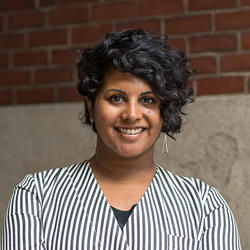Suzanne Mathew

Suzanne Mathew is a registered landscape architect with a multidisciplinary background. The courses she teaches at RISD use a range of disciplinary methods—from artistic to theoretical to scientific—to help students develop a rigorous, analytical and intuitive approach to design.
Mathew’s work focuses on developing methods to measure and visualize the invisible and temporal aspects of landscape architecture. Her research techniques range from developing tools to document changes in environmental phenomena such as light, temperature and sound to experimenting with hand and digital methods for drawing spaces that change over time. She has published and presented her work on temporal and dynamic spaces both nationally and internationally, including articles in the recent publications Representing Landscapes: Hybrid (Amoroso) and Innovations in Landscape Architecture (Anderson and Ortega). With a background in science, architecture and landscape architecture, she focuses on the relationship between human infrastructures and environmental resilience. Recent work has included consulting for the Mayor's Institute on City Design, working with the National Parks Service to develop visitor experience strategies (as part of a team selected through the National Parks Now Competition) and presenting climate resilience strategies at the Newport Historical Society's Keeping History Above Water conference.
Mathew has earned a number of awards, including multiple ASLA Honor Awards, the Stanley and Helen Abbot Award for Excellence in Landscape Design, The Ken Roberts Memorial Award for Excellence in Hand Delineation and the AIA Washington DC UnBuilt Honor Award. In addition to teaching at RISD, she has worked as a designer and project manager at Landworks Studio in Boston, overseeing projects in locations ranging from Cambridge, MA to Nanjing, China.